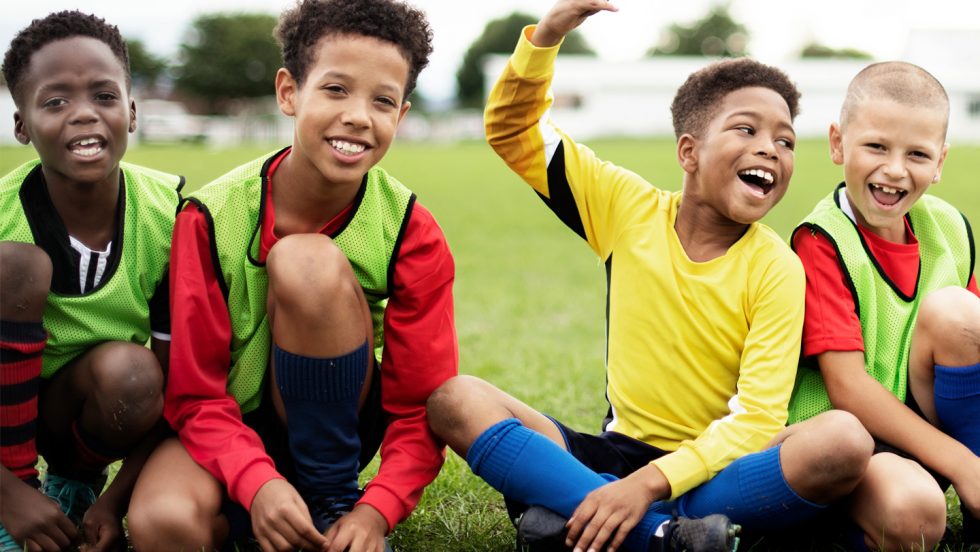
Proposed structural changes would help youth sports programs meet participants' developmental needs
Meredith Whitley, PhD, associate professor of health and sport sciences at Adelphi University, has spent years researching sport for development (SfD) programs designed to help young people in underresourced communities. Yet, over the past decade, as she observes in one recent paper, the youth sport model has taken a professionalized turn, emphasizing skill and performance over broader developmental benefits. Dr. Whitley believes it’s time for the field to shift its focus back toward young people’s holistic well-being. In a string of recent papers and presentations, she outlines steps programs can take to ensure they are promoting inclusion and belonging, fostering community connections, and prioritizing youths’ mental, emotional and social health.
In “Narratives of trauma and resilience from Street Soccer players” (Qualitative Research in Sport, Exercise and Health, February 8, 2021)1, Dr. Whitley and Adelphi graduate student Sara McLaughlin studied eight young athletes enrolled in the group Street Soccer USA. Researchers from the University of theWest of Scotland tracked eight others from Street Soccer Scotland. The players all belonged to populations (such as homeless, immigrant and refugee) with high rates of trauma exposure.
Dr. Whitley and her colleagues followed the players’ participation in the Homeless World Cup, an international tournament dedicated to raising awareness about homelessness. Because the programs embraced trauma-informed practices that promote resilience and healing—such as providing a stable, inclusive environment and encouraging emotional self-regulation—many players showed growth in positively adapting to their circumstances, the authors found, with some even “able to cultivate and act on their dreams for the future.” McLaughlin, now a manager at Laureus Sport for Good Foundation USA, noted, “This paper has the potential to guide direct-service programs to better support the needs of their participants.”
While serving as a member of the President’s Council on Sports, Fitness & Nutrition Science Board, Dr. Whitley was lead author on “Reenvisioning Postpandemic Youth Sport to Meet Young People’s Mental, Emotional, and Social Needs” (Translational Journal of the American College of Sports Medicine,Fall 2021)2 and “Reimagining the Youth Sport System Across the United States” (Journal of Physical Education, Recreation & Dance, October 25, 2021).3 Both articles offer recommendations for correcting inequities exacerbated by the COVID-19 pandemic, with a goal of reestablishing young people “as the central focus, beneficiary, and authority within the integrated youth sport system.”
One key recommendation is a pivot to “systems thinking,” a framework that recognizes the influence of multiple interlocking social and political systems on participants’ well-being. This approach promises to keep programs “locally driven, contextually relevant and culturally informed, with youth fully engaged in the design and delivery of their own youth sport experiences.” Empowering youth to take control of their sports programs, the authors write, “supports a sense of autonomy (i.e., the ability to make decisions for oneself), which then contributes to positive identity development, self-advocacy, and agency.”
Dr. Whitley took cues from economists and entrepreneurs to propose another round of organizational solutions. In “Using Behavioral Economics to Promote Positive Youth Development through Sport” (Journal of Sport Psychology in Action, February 11, 2021),4 she addresses a widespread problem in the SfD field: Although many youth sports programs actively teach skills like leadership in an effort to promote behavioral growth, research has shown that these outcomes rarely last. The article lays out nine interconnected tools, commonly used in behavioral economics, that can be adopted by sports programs to drive long-term positive development.
In “Place-Based Sport for Development Accelerators: A Viable Route to Sustainable Programming?” (Managing Sport and Leisure, September 29, 2020),5 Dr. Whitley critiques the top-down model used by many nonprofit youth sports organizations, in which programs are run by people with little or no connection to the community. Instead, she suggests looking outside of the SfD field for inspiration.
“In the tech world, incubators and accelerators support new ideas,”she said. “Why can’t we do that for communities? That way people could develop new ideas and new programs and get the resources they need, making programs much more likely to remain effective and sustainable in the long term.” The more support community leaders receive, she writes, the better prepared they will be to “meaningfully address local issues and enact transformational social change.”
Footnotes:
1 Whitley, Meredith A., and Jordan A. Donnelly, Daryl T. Cowan, and Sara McLaughlin. “Narratives of trauma and resilience from Street Soccer players.” Qualitative Research in Sport, Exercise and Health, vol. 14, iss. 1, 08 Feb 2021, pp. 101-118.
2 Whitley, Meredith A., and Alan L. Smith, Travis E. Dorsch, et al. “Reenvisioning Postpandemic Youth Sport to Meet Young People’s Mental, Emotional, and Social Needs.” Translational Journal of the American College of Sports Medicine, vol. 6, iss. 4, Fall 2021, pp. 1-7.
3 Whitley, Meredith A., and Alan L. Smith, Travis E. Dorsch, et al. “Reimagining the Youth Sport System Across the United States.” Journal of Physical Education, Recreation & Dance, vol. 92, iss. 8, 2021, pp. 6-14.
4 Whitley, Meredith A. “Using Behavioral Economics To Promote Positive Youth Development through Sport.” Journal of Sport Psychology in Action, published online 11 February 2021.
5 Whitley, Meredith A., and Jon Welty Peachy. “Place-Based Sport for Development Accelerators: A Viable Route to Sustainable Programming?” Managing Sport and Leisure, published online 29 September 2020.